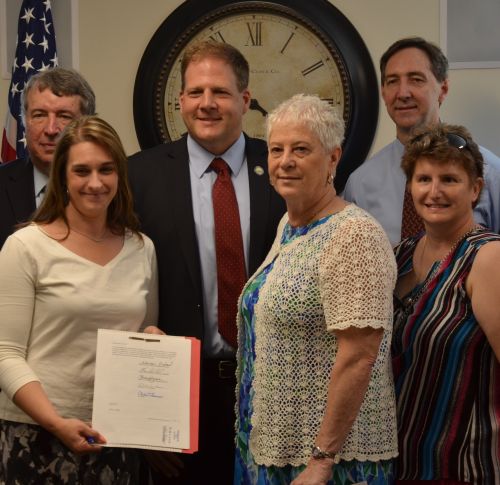Littleton Downtown Riverwalk
Enjoying Mt. Washington
Franklin's Lesson For Today
NH Helicopter Rides
FREE Stuff To Do
NH Lupine Photos
Avoiding Romance Scams
Pittsburg NH Profile
Mascoma Lake Profile
Farm To Table Restaurants
Carroll NH (Twin Mtn.) Profile
Colebrook NH Profile
Ben Kilham Profile
Whitefield NH Profile
Clark's Trading Post
Sununu Signs HB 400
Improves New Hampshire's mental health system.
Concord, NH - Please see below for Governor Chris Sununu's abridged remarks at yesterday's bill signing with mental health professionals, advocates, and lawmakers, prior to signing HB 400 into law, aimed at reforming DCYF and improving New Hampshire's mental health system.
I'm pleased today to be here today to sign House Bill 400. It represents progress on two major pieces of my legislative agenda: beginning to address New Hampshire's mental health crisis and reforming DCYF.
Dealing with these two critical issues are not options. They are absolute necessities, that our state must address immediately or lives will continue to be endangered.
Today is a great step in the right direction and we would not be here today without the help of my working group on mental health and I am pleased to have many of them standing with me today. Chief among those that must be recognized is NAMI's Ken Norton, who met with us immediately upon my taking office to stress what a crisis this was.
House Bill 400 serves as the foundation to address severe shortages and gaps in our State's mental health system. It, along with the budget bills, constitutes a significant investment in policies and dollars to take on the challenges of the system. While HB 400 contains requirements for plans and reports, the budget bill puts those plans into action.
HB400 requires the DHHS to develop a new comprehensive 10 year plan for the mental health system. The Department will conduct a needs assessment, including an inventory of existing services and gap analysis to determine need versus the current capacity of services.
The plan will prioritize needs, include recommendations to reduce the number of individuals waiting in emergency rooms for inpatient psychiatric services, policy changes and implementation of models of care as well as establish performance metrics.
The bill requires the DHHS to develop a plan to ensure the protection of individuals statutory and due process rights when they are subject to involuntary admissions and awaiting transition to NH Hospital or a Designated Receiving Facility.
The bill requires the DHHS Commissioner to develop a plan to safely remove the 24 youths from NH Hospital and ensure they receive care.
The budget bill provides language and funding to establish:
Up to 20 designated receiving facility beds for individuals experiencing a mental health crisis and are meet the criteria for involuntary admissions due to a threat of harm to themselves or others. This is a temporary measure for 2 years to mitigate the current emergency room waitlist situation.
Up to 40 beds of supported housing and community residences for individuals transitioning from NH Hospital and designated receiving facilities to the community. This will bolster the community housing options so that once individuals are ready to be discharged, they can get housing and mental health services.
An additional Mobile Crisis Unit and Apartments. The new team and apartments will be targeted to the area that can demonstrate the highest area of need in the State.
A new system to triage inpatient psychiatric bed availability. This includes a data management system to provide real-time information about inpatient beds as well as a clinician to support those beds.
As the House and Senate work on the budget, it is critical that these services be addressed and prioritized. While I am pleased that we have made progress, we are far from done. In fact, my mental health working group meets tomorrow to discuss a second phase for our efforts.
We need real reform for DCYF and this bill again makes progress through several concrete steps. First, it requires a founded report of abuse and neglect to be based on a preponderance of the evidence to ensure consistency with the case law.
Second, it inserts a definition of "unfounded but with reasonable concern." This category between "founded" and "unfounded" will allow DCYF assessment workers to monitor cases that abuse or neglect are not founded but where concern exists about the potential for future abuse or neglect.
Third, the bill requires that, in any case with two or more previous unfounded cases, DCYF conduct an administrative review of all prior reports. This will provide a heightened level of scrutiny where there are repeated reports involving a family and will help identify patterns or a course of conduct that may not have been initially apparent.
Fourth, it permits the department of health and human services to issue a confidential letter of concern when an investigation reveals reasonable concerns encouraging the person to seek family support services to help them address those concerns.
Fifth, the bill authorizes the department of health and human services to keep records of "unfounded but with reasonable concerns" for a period of 7 years. This is longer than the 3 year retention period of regular "unfounded" cases and reflects the heightened level of concern that exists for these reports.
And finally, the bill extends the Commission to Review Child Abuse Fatalities until June 30, 2018.
Again, work will continue to be made in this area as the budget process continues and again, I expect that this area will receive considerable attention.
But for now, I want to thank everyone who has worked hard to get us to this point and I am proud to sign House Bill 400.

Posted 6/15/17
Seussical (9/6-15)
2001 Space Odyssey (9/7)
Muster in the Mountains (9/7-9)
Wingzilla (9/8)
Canzoniere Grecanico Salentino (9/9)
Things [Mom] Taught Me (9/13-23)
Reach the Beach (9/14-15)
WM Storytelling Festival (9/14-16)
Metallak Race (9/15)
Mandeville & Richards (9/15)
Cohase Film Slam (9/16)
Tricycle Grand Prix (9/16)
Rodney Crowell (9/21)
NH Highland Games (9/21-23)
Don Who (9/22)
Harvest Celebration (9/22)
Health & Wellness Fair (9/22)
Jeep Invasion (9/22)
Lakes Region Tri Festival (9/22-23)
Pat Metheny (9/26)
Driving Miss Daisy (9/27 - 10/6)
Neko Case (9/27)
Shot of JD (9/28)
Dixville Half Marathon (9/29)
New Hampshire Marathon (9/29)
Matthew Odell (9/30)
Lincoln Fall Craft Festival (10/6&7)
Sparrow Blue & Crowes Pasture (10/6)
Oktoberfest (10/6-7)
White Mountain Oktoberfest (10/6-7)
Fall Foliage Celebration (10/6-8)
Sandwich Fair (10/6-8)
Paddle the Border (10/7)
Lincoln Fall Craft Festival (10/7-9)
Shadow Play (10/10)
Killer Joe (10/11-21)
Greg Brown (10/12)
Camping & RV Show (10/12-14)
Riverfire & Horrorfest (10/13)
Jay Stollman Band (10/19)
Murder Dinner Train (10/19-20)
Pumpkin Patch Express (10/19-21)
All Things Pumpkin (10/20)
Ethan Setiawan Band (10/20)
Bettye LaVette (10/26)
Murder Dinner Train (10/26-27)
Pumpkin Patch Express (10/26-28)
Berlin Jazz (10/27)
Photo Galleries





Business Directory
Moffett House Museum
Northland Restaurant
Perras Treasures Party Store
Personal Touch Home Health
White Mountain Cottages
more ►


Clark's Trading Post
Cog Railway
Conway Scenic Railroad
Flume
Fort Jefferson Fun Park
Jericho Mountain ATV Park
Kancamagus Highway
Littleton Riverwalk
Lost River Gorge
Mountain Meadow Funplex
Mt. Washington Auto Road
Polar Caves
Santa's Village
Storyland
Vertical Ventures
Whale's Tail Water Park
Woodstock Inn & Brewery
more ►
Community Profiles
Bethlehem
Bretton Woods
Colebrook
Conway
Franconia
Gorham
Hanover
Jackson
Lebanon
Lincoln
Littleton
North Conway
Pittsburg
Plymouth
Twin Mountain
Whitefield
Wolfeboro
more ►
Recreation and Tourism
Farm To Table Restaurants
Hiking To Crash Sites
Little Ski Areas
Local Movie Theaters
Local Performance Theaters
Moose Tours
more ►
Other Resources
NH Cabins & Cottages
NH Census Info
NH Data (OEP)
NH Fishing Reports
NH Foliage Report
NH Hiking Trail Conditions
NH Lottery
NH Movie Guide
NH Road Conditions
NH Ski Reports
NH Snowmobile Trail Reports
NH State Parks
NH Town Officials Directory
NH Weather
Summer Safety Tips
[.pdf]
White Mtn. National Forest
VisitNH.Gov
Copyright 2012-2018 by George C. Jobel , 603-491-4340. All Rights Reserved.





















